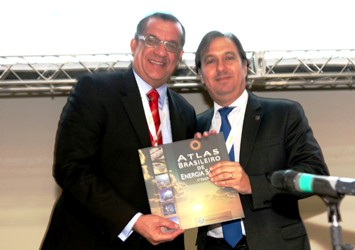

Brazil: Energy Ministry with Big Plans for Solar

The focus of the Intersolar South America in Sao Paulo: photovoltaics. Increasing electricity prices in Brazil and net metering options have generated interest among PV manufacturers from all over the world. The fair organisers, German-based Solar Promotion, said that the number of exhibitors had risen by another 20 % to more than 220. This only made it even more crucial for the newly founded Brazilian solar thermal industry association Abrasol to fly the flag. The opening speech on the Strategic Importance of Solar Thermal in Brazil, the title of the solar heat conference day on 23 August, came from Eduardo Azevedo (right), State Secretary of Energy Planning and Development at the Brazilian Ministry of Mines and Energy, MME. He underlined the importance of replacing electric shower heads with solar water heaters to increase efficiency. The ministry expects the share of residential SWHs to double from today’s 7 % to 14 % by 2026 (see the following chart). The photo shows Abrasol´s President, Amauricio Gomes Lúcio, presenting Azevedo with the Brazilian Atlas of Solar Energy.
Photo: Intersolar South America / Solar Promotion

Doubling of residential solar water heaters within 10 years
Source: MME
Carlos Hashimoto, who works at Caixa Econômica Federal, the government-owned bank managing the Minha Casa Minha Vida social housing programme, made another promising statement in the afternoon: “About a year ago, we evaluated PV for social housing units, but decided that we will stick to solar water heaters.” Unfortunately, Hashimoto could not provide any information on the start of the programme’s third phase, which had been delayed.
From 2009 to 2014, Caixa subsidised 224,405 solar thermosiphon systems of between 1.5 and 2 m² each. Abrasol´s annual statistics show that this support together with other social housing projects prompted demand to rise to 20 % of the newly installed collector area in 2015 and continued to be as much as 16.7 % in 2016. The delay in implementing the third phase for another 3 million housing units has been the result of public budget restrictions and has forced some collector and tank manufacturers to lay off a great many workers.

Several solar thermal manufacturers, such as Soletrol (see photo), Prosol, Bosch/Heliotek, Rinnai, Tuma/Solarem, Heliodin, Solis and Kisoltec, used the fair to showcase their products.
Photo: Bärbel Epp
Struggle to Promote Solar Thermal
The market is facing uncertain times because of a reform which is underway in the power sector and might change the existing energy efficiency quota of the utilities. The original regulation is from 2000 and is called PROPEE or Procedures of the Energy Efficiency Programme. It stipulates that electricity suppliers must invest 0.5 % of their net turnover on energy efficiency measures. Solar water heaters replacing electric shower heads are eligible for the budget from this programme, which has so far been managed by the Electricity Regulatory Agency (ANEEL) and provided the entire funding for many solar thermal projects at educational and healthcare facilities or low-income homes. Azevedo said during his presentation that the agency in charge of the 0.5 % budget would soon be the energy ministry and fund use would be specified in the new National Energy Efficiency Plan, or PNEf, which was currently being drafted. Solar thermal had been incorporated into the new regulation in a “rather shy way,” he added and encouraged attendees to get involved in the important political process. Another troublesome development could result from the above mentioned power market reform, which is said to give independent renewable electricity producers easier access to the grid. It could result in a quota change by separating the “wiring business” from supply, reducing utilities’ net turnover, the basis for calculating the 0.5 % share.
Abrasol has already started lobbying for a better inclusion of solar heating technologies into the new PNEf and presented ideas during a consultation at the MME in Brazil’s capital, Brasilia, in early August. It called for the installation of 2 million solar heating systems over four years, with half the related budget of BRL (Brazilian Real) 4 billion (EUR 1.1 billion) to be allocated from PROPEE and 50 % from beneficiaries. This measure is expected to save 210 GWh in the first year and more than 3,000 GWh over a system’s lifetime. Abrasol also presented the international project Solar Payback that aims at increasing the deployment of industrial solar heat and the campaign Um Solar em cada Casa (a Solar in every Home).
Websites of organisations mentioned in this article:
Abrasol: http://www.abrasol.org.br/
ANEEL: http://www.aneel.gov.br/
Intersolar South America: https://www.intersolar.net.br/en/home.html
Solar Payback: http://www.solar-payback.com
Bosch/Heliotek: http://www.bosch.com.br/br/termotecnologia/
Heliodin: http://www.heliodin.com.br
Kisoltec: http://www.kisoltec.com.br
Prosol: http://www.prosolsolar.com.br
Rinnai: http://www.rinnai.com.br
Soletrol: http://www.soletrol.com.br